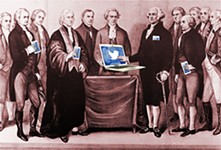Education: 'It's Time To Be Innovative'
Something everyone can agree on: digital classrooms
By Richard Whittaker, Fri., March 16, 2012
The digital classroom is inevitable. That may have been the one point of agreement between all parties during last week's SXSWedu technology and education conference – but the consensus stopped there. On one side, there were optimists who believe that technology can create new options and new opportunities. On the other, start-ups and corporations with a product to sell. And in the background, the low rumbling that current policies will only worsen the digital divide between richer kids with easy access to technology and poorer kids without.
The repetitive mantra was that education can learn a lot from gaming. The title of John Boyer's presentation – Supersizing the Classroom: 3,000 Students & Beyond – sounded like the Virginia Tech senior instructor had turned his international affairs courses into body storage. Yet he argued that his innovative use of social media like Twitter for student projects and Skype for office hours actually made for closer communication. His teaching system allows students to pick from a menu of different paths to a passing grade, and mirrors the self-tailored and often collaborative achievement systems of massively multiplayer online games like World of Warcraft.
Jane McGonigal, author of Reality Is Broken, argued more educators should follow that model. Quoting play theorist Brian Sutton-Smith's aphorism that "the opposite of play is not work; it is depression," she noted that the average high schooler will have played 10,000 hours of games by graduation – only 100 hours less than they will have spent in the classroom. She advocated for education to be more like gaming, where epic fails are an accepted part of the learning curve. Yet her vision for innovative, creative, collaborative education is exactly the opposite of teaching to the test and of the direct instruction model – digital learning by repetition and rote – being advocated in Austin, for relevant example, by IDEA Public Schools. Even though new research has shown the value of trial and error, she said, "We can't imagine a school where we allow students to fail 80 percent of the time."
The idea that education can be fun and engaging is scarcely revolutionary. As producer and host of Reading Rainbow, actor and keynote speaker LeVar Burton spent years using the PBS show to spread what he called "stealth learning": His new challenge is to make the experience more contemporary. He attended in advance of the launch of the new Reading Rainbow app and argued that the successful integration of digital technology could be the biggest innovation in teaching since chalk. However, the omnipresent fear is that this will only place a greater burden on children in communities with little or no access to digital media at home. "There are ZIP codes just like that across America," Burton told the Chronicle, and he gave a stern warning that everyone needs to get serious about tackling the digital divide. He said, "If you have half a wit and you look at what's happened in the education system in the last 10 years, you would be scared by what is happening and how we are shooting ourselves in the foot." It is not an impossible challenge, he added. "We have the wherewithal. All we need do is circle the wagons around the will to get it done, and it's done."
But it will require a huge investment, and the cash is just not there. The federal education budget contains no dedicated funds for technology. Meanwhile many states, including Texas, have zeroed out their technology allotment, and right-wing groups such as Americans for Prosperity have effectively declared war on the idea of school bonds – increasingly the only revenue source for many districts to invest in computers. In fact, the one place where there seems to be no shortage of money for technology in education seems to be high-stakes testing, and that controversy unavoidably reached even the keynote speakers.
While U.S. Secretary of Education Arne Duncan continued his criticism of No Child Left Behind, Marjorie Scardino, CEO of publishing giant Pearson, has used that law to become a dominating force in education publishing and in testing policy. According to Geoff Fletcher, deputy executive director of the State Educational Technology Directors Association, "To say we're doing assessments all the time is an understatement." Yet, he argued, there's a big difference between teachers checking how students are progressing and the artificial pressures of high-stakes testing. "Arne Duncan knows that assessment drives instruction," Fletcher told his audience, and that's why the Department of Education has assigned $350 million in Race to the Top funding for a consortium of states to develop new assessment standards. (At an Austin Community College forum held at the Eastview campus Thursday, Occupy Austin "mic-checked" Duncan in a brief protest, loudly denouncing the privatization and corporatization of public education.)
Assessment is a huge business. Scardino avoided talking about her own achievements ("Because my mother said that was tacky," she said) but Pearson has done extremely well from assessment, and continues to do so. Later this month, it launches its latest tool, designed for schools to see whether their computer systems can handle the strains of the next generation of online testing. Products like that are extremely lucrative: According to the UK newspaper The Guardian, in 2011, Pearson's North American Education division's gross revenue dropped by 2% to $4.03 billion. At the same time, Pearson's profits rose 5% to $771 million. Yet some education advocates say her firm deserves a failing grade: After all, Pearson currently holds a five-year, $500 million contract with the state of Texas for the new State of Texas Assessments of Academic Readiness program. The implementation has been a catastrophe (see "Not the Brightest STAAR," Feb. 24) and Pearson's massive payday at a time when school districts are in financial turmoil has been highly controversial. So there was little surprise that there were protestors outside the Austin Convention Center during Scardino's speech. Education Austin co-President Ken Zarifis scoffed at Scardino's claim that average was no longer acceptable in education, especially considering her firm's key business model. "Multiple-choice tests as an assessment of children's learning and knowledge is a very average – I would say below-average – way of testing knowledge," he told the Chronicle. "It's time to be innovative."
Got something to say on the subject? Send a letter to the editor.











